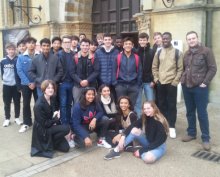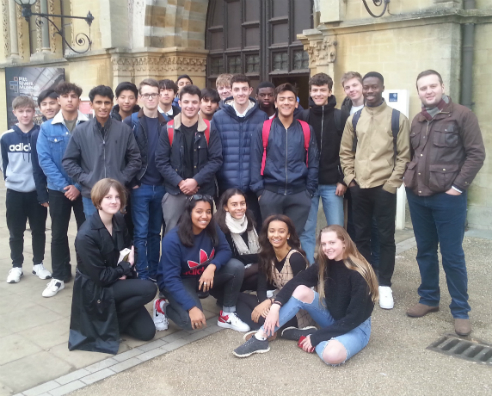
Anna Hull (Lower Sixth) and Mrs Everitt (ToK Co-ordinator)
Last Friday, the Lower Sixth IB cohort visited New College, Oxford, and the Pitt Rivers Museum with their fellow Bedford School peers, for a trip tied in with their Theory of Knowledge (ToK) curriculum.
ToK is assessed through an oral presentation and a 1,600-word essay. It asks students to reflect on the nature of knowledge, and on how we know what we claim to know.
Ann Hull writes: “The purpose of the visit to the Pitt Rivers Museum was to explore the collection of archeological and ethnographic items on display in the museum, as part of our Theory of Knowledge studies. Interestingly, the displays were arranged not in order of the country of origin, but based on the function of the object - for example we were able to view an extensive display of weapons from different cultures, including clubs, swords, and pistols. This demonstrated how different civilisations have been able to use their varying knowledge and resources in order to solve similar problems.”
Mrs Everitt added: “It was fascinating to think about the historic connections between New College and the Harpur Trust, which have extended over many years; even now, each school has a New College-appointed trustee, in the case of Bedford Girls' School, Professor George Ratcliffe, Head of the Department of Plant Sciences.
“For me, the tour of the college was the element in the day that raised most questions about the relationship between education and the learning environment: is an ideal educational establishment, for example, one in which everyone works, eats and worships as a community?
“The chapel at New College (which was founded in 1379) is its grandest building, and was completely central to college life. Yet as you walk further away from the old centre of the university, you encounter museums such as the University Museum of Natural History (1855), sometimes referred to as Oxford's cathedral to science (which contains the Pitt Rivers Museum at the rear). It was here that the 'great debate' between Samuel Wilberforce, Bishop of Oxford, and the biologist Thomas Huxley took place, about Charles Darwin's theory of evolution by natural selection.
“Certainly, education has evolved a huge amount, from the study of liberal arts, for example, in Mediaeval times, to the vast array of subjects studied today. It did make me wonder to what extent education is culturally derived, and to what extent education is imposed on a shifting culture to preserve the priorities of the past.”
Anna concludes: “Overall, this trip was a fascinating experience, and one which we will be able to draw upon when studying the development of knowledge and indigenous knowledge systems during our IB course.”





















